Eisenhower seems like a easy win, though Stevenson or even Papa Kennedy could be a threat.
The Presidents: The Vietnam War Edition
- Thread starter Nathan Madien
- Start date
-
We have updated our Community Code of Conduct. Please read through the new rules for the forum that are an integral part of Paradox Interactive’s User Agreement.
You are using an out of date browser. It may not display this or other websites correctly.
You should upgrade or use an alternative browser.
You should upgrade or use an alternative browser.
Ahh the famous US 'Hydrogen Shed'; anything that weights 60+ tonnes (i.e. more than a fully laden B-29!) can't be called a bomb.
Will Ike run? And if so will he give a damn about the vital North Borneo question? I'm guessing 'yes' and 'No'. But then I doubt anyone, apart from the people who live there and some slightly obsessive Filipinos, cares about North Borneo!
Will Ike run? And if so will he give a damn about the vital North Borneo question? I'm guessing 'yes' and 'No'. But then I doubt anyone, apart from the people who live there and some slightly obsessive Filipinos, cares about North Borneo!
But then I doubt anyone, apart from the people who live there and some slightly obsessive Filipinos, cares about North Borneo!
The Imperial General Staff! It's the perfect springboard for the liberation of the Phi...Oh snag. Wrong AAR.
Eisenhower seems like a easy win, though Stevenson or even Papa Kennedy could be a threat.
I like Taft!
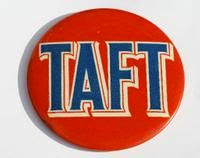
Taft for President, who cares if he only serves for six months!

Taft for President, who cares if he only serves for six months!
Kurt_Steiner: Correct.
Ciryandor: Okay...but why does it matter?
FlyingDutchie: You're right. The United States has no interest at this time in helping the Phillipines acquire some obscure piece of real estate.
Although, the Chinese people can't catch a break either in OTL or this TTL.
Eisenhower probably could bind the nation, if only he just stops dithering and get a move on.
mad general: Papa Kennedy... *tries not to throw up at the thought of him*
The Kennedy Brothers I can put up with...Papa not so much.
El Pip: The reason I mentioned the hydrogen bomb is that in my game I finished researching it on November 28th, 1951 (a year ahead of OTL schedule). I therefore decided to incoporate it into my story.
You're right, of course, on all counts.
trekaddict: It's okay. Sometimes I get AAR mixed up too.
volksmarschall: There's a campaign slogan right there. :rofl:
"Vote for Taft before he drops dead!"
Ciryandor: Okay...but why does it matter?
FlyingDutchie: You're right. The United States has no interest at this time in helping the Phillipines acquire some obscure piece of real estate.
Although, the Chinese people can't catch a break either in OTL or this TTL.
Eisenhower probably could bind the nation, if only he just stops dithering and get a move on.
mad general: Papa Kennedy... *tries not to throw up at the thought of him*
The Kennedy Brothers I can put up with...Papa not so much.
El Pip: The reason I mentioned the hydrogen bomb is that in my game I finished researching it on November 28th, 1951 (a year ahead of OTL schedule). I therefore decided to incoporate it into my story.
You're right, of course, on all counts.
trekaddict: It's okay. Sometimes I get AAR mixed up too.
volksmarschall: There's a campaign slogan right there. :rofl:
"Vote for Taft before he drops dead!"
Last edited:
Honestly, I personally don't really give a damn about the North Borneo thing; it's someone else who gets too worked up on it. Besides, it's not my cup of tea, as I would prefer to gauge the reaction in Siam, Cambodia and Laos more, as they are much closer to any fighting that might flare up. The only reasonable thought I have on why the dispute could matter would be the use of the Philippines as a convenient, secure staging point for American intervention in Asia. Sure, Formosa's also in the hands of an American ally, but Manila Bay is just too attractive a spot to do power projection in the South China Sea.
Ciryandor: That's a good point. What role (if any) the Philippines will play in all this is yet to be determined.
Last edited:
The Spark
In October, while Eisenhower dithered, Ohio Senator Robert Taft threw his hat into the ring and announced his candidacy. The son of former President William Howard Taft, Robert had been serving in the Senate since January 1939. Very detail-oriented, the Senator also had a reputation for being icy and difficult to work with. With solid backing from the Conservative wing of the G.O.P. (including the endorsement of fellow Ohioan Vice President John Bricker), and no one around to seriously challenge him, Mr. Republican – the nickname referring to the fact that the Senator wielded immense influence on Capitol Hill – was named the frontrunner by many political pundits.
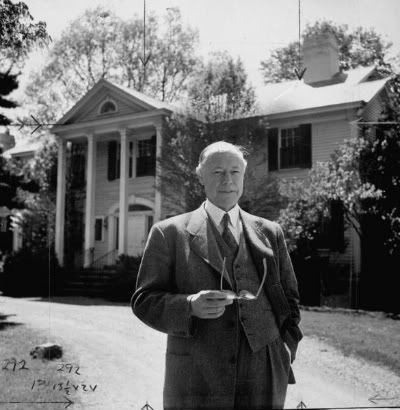
In Dewey’s mind, it was intolerable to allow Taft to win the nomination. Why? To put it bluntly, the President and the Senator hated each other’s guts. What started out as disagreements over the direction of the postwar domestic agenda – Dewey wanted to build upon the surviving New Deal programs while Taft wanted to do the exact opposite – spiraled into an ugly ideological feud that often got personal (one time, Dewey remarked that Taft should have carnal relations with himself). What was at stake for them was control of the Republican Party. Like a title boxing match, the winner of this battle would become the Party’s undisputed leader. Both men wanted to be the champ, and neither one was willing to back down.
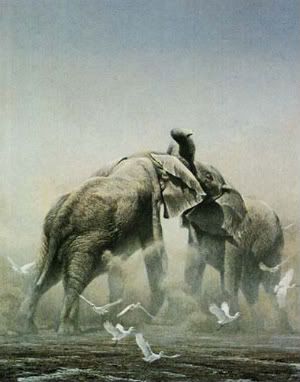
Starting in 1949, the venomous feud between the leader of Liberal Republicans and the leader of Conservative Republicans led to gridlock in the nation’s capitol. With the White House and Congress locked in a no-holds-barred power struggle that greatly hindered the effectiveness of the Federal Government, it didn’t take long for the American people to become fed up with the in-fighting. In the 1950 midterm election, angry voters punished the Republican Party by kicking them out of power in both houses of Congress. The Democrats won big, picking up fifty-six seats in the House of Representatives and eight seats in the Senate (including Thomas E. Fairchild’s win over Republican incumbent Alexander Wiley in Wisconsin).
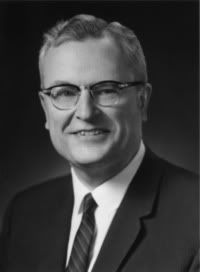
Having cost their Party control of Congress, Dewey and Taft set their sights on the next major battlefield: the 1952 Presidential election. The President was willing to do whatever it took to prevent his hated rival from succeeding him. Anyone who supported Taft would be regarded as an unforgivable enemy. Thus when Bricker announced his support for Taft, Dewey virtually stopped talking to him. You see, by late 1951, the once-cordial relationship between the President and Vice President was nearing a breaking point. A staunch Midwestern Conservative, Bricker naturally opposed Dewey’s fight with Congress over the domestic agenda and openly took Taft’s side in the infamous political feud. Dewey didn’t take opposition from his own Vice President well; when the aforementioned endorsement came, it was the final straw. “I wish Ohio broke off and slid into Lake Erie,” he allegedly cursed in private.
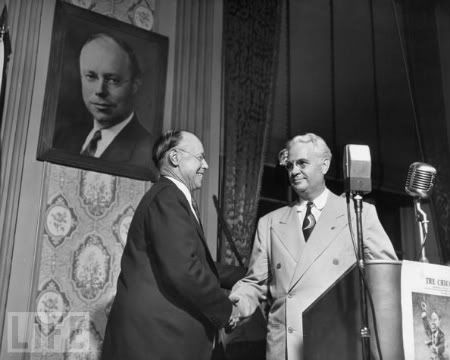
Ironically, Taft’s entry into the race provided the President the spark he needed to light a fire under Eisenhower’s rear. Meeting with Eisenhower at Dapplemere, Dewey asked him point-blank whether or not he would support the Ohio Senator if he received the Presidential nomination. Ike answered that “as a good Kansas Republican, I would.”
Dewey noticed that Ike had answered the question with an obligatory tone in his voice and pressed further in his questioning. Would Eisenhower endorse Taft’s diehard isolationism? The question trapped the elusive General. Ike admitted that he had his reservations, which was enough for the President. Dewey walked away from the meeting with the feeling that Ike would accept the nomination if it meant blocking Mr. Republican. Speaking of whom, he was busy in the meantime solidifying his chances of winning the nomination. With the 1952 Republican National Convention set to take place at Chicago’s International Amphitheatre next July, Taft made sure all the key posts at the upcoming convention – including rules, credentials, and platform assignments – would be stocked with his supporters.
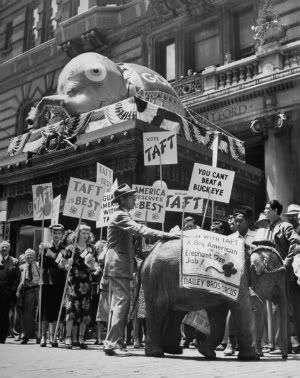
In November, the President’s effort to recruit Ike was reinforced when the CIA Director threw in his support. Lodge, a staunch Dewey loyalist ever since joining the Administration in early 1945 to oversee intelligence, agreed wholeheartedly that only Ike could ensure a Republican victory next year and that Taft would just lead the Party to defeat at the polls. He warmed the General to the idea of running simply to prevent Taft from leading the United States down the isolationist route. Eisenhower agreed that a Taft Presidency would weaken the United States in the face of a nuclear-armed Soviet Union. For instance, Taft believed domestic Communism was more dangerous than Communism aboard – Eisenhower on the other hand believed in rolling back international Communism. Finally in late December, after months of vocal and persistent pressure, Eisenhower reluctantly agreed to run – on one condition. Rather than actively seek the nomination, he would rely on grassroots support to carry him forward. “I consider a clear-cut call to political service by the will of the Republican Party and the people to be the highest form of duty,” Ike said in a carefully-worded statement. On January 6th, 1952, “I like Ike” (a phrase coined by researcher Peter G. Peterson to describe peoples’ rational for supporting Eisenhower even though they didn’t know where he stood on the issues) supporters entered his name into the first-in-the-nation New Hampshire Republican Primary. Now one step closer to having his favorite General be his handpicked successor, Dewey credited Lodge for pushing the “Ike for President” effort over the top. Needless to say, the CIA Director was quite pleased with himself.
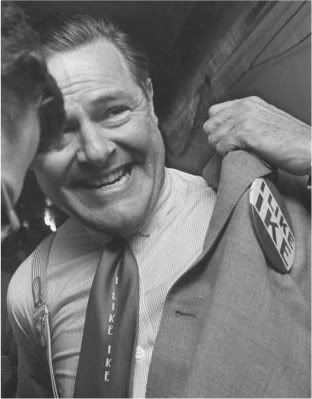
While the two sides geared up to do battle over the nomination, the Democrats found themselves under attack by the other Senator from Wisconsin.
In October, while Eisenhower dithered, Ohio Senator Robert Taft threw his hat into the ring and announced his candidacy. The son of former President William Howard Taft, Robert had been serving in the Senate since January 1939. Very detail-oriented, the Senator also had a reputation for being icy and difficult to work with. With solid backing from the Conservative wing of the G.O.P. (including the endorsement of fellow Ohioan Vice President John Bricker), and no one around to seriously challenge him, Mr. Republican – the nickname referring to the fact that the Senator wielded immense influence on Capitol Hill – was named the frontrunner by many political pundits.

In Dewey’s mind, it was intolerable to allow Taft to win the nomination. Why? To put it bluntly, the President and the Senator hated each other’s guts. What started out as disagreements over the direction of the postwar domestic agenda – Dewey wanted to build upon the surviving New Deal programs while Taft wanted to do the exact opposite – spiraled into an ugly ideological feud that often got personal (one time, Dewey remarked that Taft should have carnal relations with himself). What was at stake for them was control of the Republican Party. Like a title boxing match, the winner of this battle would become the Party’s undisputed leader. Both men wanted to be the champ, and neither one was willing to back down.

Starting in 1949, the venomous feud between the leader of Liberal Republicans and the leader of Conservative Republicans led to gridlock in the nation’s capitol. With the White House and Congress locked in a no-holds-barred power struggle that greatly hindered the effectiveness of the Federal Government, it didn’t take long for the American people to become fed up with the in-fighting. In the 1950 midterm election, angry voters punished the Republican Party by kicking them out of power in both houses of Congress. The Democrats won big, picking up fifty-six seats in the House of Representatives and eight seats in the Senate (including Thomas E. Fairchild’s win over Republican incumbent Alexander Wiley in Wisconsin).

Having cost their Party control of Congress, Dewey and Taft set their sights on the next major battlefield: the 1952 Presidential election. The President was willing to do whatever it took to prevent his hated rival from succeeding him. Anyone who supported Taft would be regarded as an unforgivable enemy. Thus when Bricker announced his support for Taft, Dewey virtually stopped talking to him. You see, by late 1951, the once-cordial relationship between the President and Vice President was nearing a breaking point. A staunch Midwestern Conservative, Bricker naturally opposed Dewey’s fight with Congress over the domestic agenda and openly took Taft’s side in the infamous political feud. Dewey didn’t take opposition from his own Vice President well; when the aforementioned endorsement came, it was the final straw. “I wish Ohio broke off and slid into Lake Erie,” he allegedly cursed in private.

Ironically, Taft’s entry into the race provided the President the spark he needed to light a fire under Eisenhower’s rear. Meeting with Eisenhower at Dapplemere, Dewey asked him point-blank whether or not he would support the Ohio Senator if he received the Presidential nomination. Ike answered that “as a good Kansas Republican, I would.”
Dewey noticed that Ike had answered the question with an obligatory tone in his voice and pressed further in his questioning. Would Eisenhower endorse Taft’s diehard isolationism? The question trapped the elusive General. Ike admitted that he had his reservations, which was enough for the President. Dewey walked away from the meeting with the feeling that Ike would accept the nomination if it meant blocking Mr. Republican. Speaking of whom, he was busy in the meantime solidifying his chances of winning the nomination. With the 1952 Republican National Convention set to take place at Chicago’s International Amphitheatre next July, Taft made sure all the key posts at the upcoming convention – including rules, credentials, and platform assignments – would be stocked with his supporters.

In November, the President’s effort to recruit Ike was reinforced when the CIA Director threw in his support. Lodge, a staunch Dewey loyalist ever since joining the Administration in early 1945 to oversee intelligence, agreed wholeheartedly that only Ike could ensure a Republican victory next year and that Taft would just lead the Party to defeat at the polls. He warmed the General to the idea of running simply to prevent Taft from leading the United States down the isolationist route. Eisenhower agreed that a Taft Presidency would weaken the United States in the face of a nuclear-armed Soviet Union. For instance, Taft believed domestic Communism was more dangerous than Communism aboard – Eisenhower on the other hand believed in rolling back international Communism. Finally in late December, after months of vocal and persistent pressure, Eisenhower reluctantly agreed to run – on one condition. Rather than actively seek the nomination, he would rely on grassroots support to carry him forward. “I consider a clear-cut call to political service by the will of the Republican Party and the people to be the highest form of duty,” Ike said in a carefully-worded statement. On January 6th, 1952, “I like Ike” (a phrase coined by researcher Peter G. Peterson to describe peoples’ rational for supporting Eisenhower even though they didn’t know where he stood on the issues) supporters entered his name into the first-in-the-nation New Hampshire Republican Primary. Now one step closer to having his favorite General be his handpicked successor, Dewey credited Lodge for pushing the “Ike for President” effort over the top. Needless to say, the CIA Director was quite pleased with himself.

While the two sides geared up to do battle over the nomination, the Democrats found themselves under attack by the other Senator from Wisconsin.
Last edited:
Few things in politics as poisonous as an interparty powerstruggle...
On the side, I wonder if Taft could have maintained his isolationism in reallife, with the Soviets leering angrily at the US.
On the side, I wonder if Taft could have maintained his isolationism in reallife, with the Soviets leering angrily at the US.
Last edited:
Shall Joseph McCarthy's witch hunts begin? Time to end domestic communism before it's too late!
On a side note, while talking domestic and international communism, I wonder who would be considered right in today's world. Was domestic or cultural marxism more dangerous than the international form? I think we all know the answer to that!
On a side note, while talking domestic and international communism, I wonder who would be considered right in today's world. Was domestic or cultural marxism more dangerous than the international form? I think we all know the answer to that!
Any significance to Thomas E. Fairchild? A brief wiki check reveals very little beyond a possible kill-joy streak, is there anything more to the man or is just a reference to the scale of the democrat fightback?
In either event the '52 election could be feisty, after all this in-fighting both sides will be in the mood for a fight with the opposition!
In either event the '52 election could be feisty, after all this in-fighting both sides will be in the mood for a fight with the opposition!
I suspect Eisenhower will beat the hell out of Taft on foreign affairs just by saying something other than "I think we should turn turtle," and he's got that damn jacket in his favor, too. Every milkman and college student home from the war knows Eisenhower, while Taft's been at home the whole time.
Kurt_Steiner: I thought politics was a minefield.
FlyingDutchie: Yeah. Just look at the Republican Party today. The Establishment versus the Tea Party...tends to not be a pretty sight.
Considering that Taft was a diehard isolationist until the day he died, I would say probably yes.
volksmarschall: The answer is "Yes". Joseph McCarthy will be witch hunting...although in TTL, his target will be a bit different. I doubt he would target the current Administration, especially since his own job is on the line. When in trouble...use DISTRACTION!
Hmm...interesting question.
El Pip: Fairchild could be a Supreme Court nominee in a Democratic Administration. Other than that, I don't see much significance to him. Fairchild is just another OTL loser who makes it into the TTL Senate. I been converting historical losers into ahistorical winners since the 1942 midterm election. Here's a brief look at some of them:
-1942: Ralph L. Carr (Republican-Colorado)
-1944: Frederick F. Houser (Republican-California)
-1946: Patrick J. Hurley (Republican-New Mexico)
-1948: Clayton D. Buck (Republican-Delaware)
-1950: Alex M. Campbell (Democrat-Indiana)
-1952: Abraham A. Ribicoff (Democrat-Connecticut)
By the way, Houser is the reason why Richard Nixon isn't in the Senate yet in TTL. Historically, Democrat Sheridan Downey won in 1944. Six years later, Downey retired from the Senate and Nixon won his seat. In TTL, Houser defeats Downey in 1944 and wins re-election in 1950. With Houser being up for a third term in 1956 and the other California Senate seat is held by Republican William F. Knowland, Nixon is stuck in the House of Representatives for the time being.
One more 1951 update, and we will move into 1952. By the way, the Brits have some leadership changes coming up in '52 as well.
c0d5579: Eisenhower could beat the hell out of Taft. Whether he will is up to the voters to decide.
FlyingDutchie: Yeah. Just look at the Republican Party today. The Establishment versus the Tea Party...tends to not be a pretty sight.
Considering that Taft was a diehard isolationist until the day he died, I would say probably yes.
volksmarschall: The answer is "Yes". Joseph McCarthy will be witch hunting...although in TTL, his target will be a bit different. I doubt he would target the current Administration, especially since his own job is on the line. When in trouble...use DISTRACTION!
Hmm...interesting question.
El Pip: Fairchild could be a Supreme Court nominee in a Democratic Administration. Other than that, I don't see much significance to him. Fairchild is just another OTL loser who makes it into the TTL Senate. I been converting historical losers into ahistorical winners since the 1942 midterm election. Here's a brief look at some of them:
-1942: Ralph L. Carr (Republican-Colorado)
-1944: Frederick F. Houser (Republican-California)
-1946: Patrick J. Hurley (Republican-New Mexico)
-1948: Clayton D. Buck (Republican-Delaware)
-1950: Alex M. Campbell (Democrat-Indiana)
-1952: Abraham A. Ribicoff (Democrat-Connecticut)
By the way, Houser is the reason why Richard Nixon isn't in the Senate yet in TTL. Historically, Democrat Sheridan Downey won in 1944. Six years later, Downey retired from the Senate and Nixon won his seat. In TTL, Houser defeats Downey in 1944 and wins re-election in 1950. With Houser being up for a third term in 1956 and the other California Senate seat is held by Republican William F. Knowland, Nixon is stuck in the House of Representatives for the time being.
One more 1951 update, and we will move into 1952. By the way, the Brits have some leadership changes coming up in '52 as well.
c0d5579: Eisenhower could beat the hell out of Taft. Whether he will is up to the voters to decide.
One more 1951 update, and we will move into 1952. By the way, the Brits have some leadership changes coming up in '52 as well.
.
Ahh now who could this turn out to be? I would expect someone like Attlee seeing as he hasn't had a chance to institute some of his landmark reforms like the NHS and 'cradle to grave care'
As far as I recall in OTL Churchill and the Conservatives had some sort of NHS as part of their '45 campaign manifesto, so that might affect things somewhat. I like Attlee, so it'd be good to see him take things for a while.
There was a general buy in on the Beveridge report as being a 'good thing' so Churchill supported a cautious implementation of it. That being the case I'd expect to see some form of 'cradle to grave' social insurance and a fairly localised health reform being either in place or being implemented. There should also be a fairly large scale reconstruction plan and a lot of house building, probably using the Marshall Plan money that in OTL Labour wasted on nationalisations.As far as I recall in OTL Churchill and the Conservatives had some sort of NHS as part of their '45 campaign manifesto, so that might affect things somewhat.
Assuming Labour went OTL they would have dismissed Beveridge as lacking in government centralisation and so will be campaigning on a plan of nationalising everything. However with the 'peace dividend' spent, along with any Marshall Plan money, damned if I can see how Labour will afford to nationalise anything. Should be interesting.
However with the 'peace dividend' spent, along with any Marshall Plan money, damned if I can see how Labour will afford to nationalise anything. Should be interesting.
By simply killing everything ten years earlier. ALso, don't you diss the NHS, it saved the life of a dear friend of mine.
I refer you to my stock argument on the NHS; If it's such a wonderful system why has no other country in the world copied it or adopted anything even remotely similar?ALso, don't you diss the NHS, it saved the life of a dear friend of mine.
Andreios II: Attlee has been able to institute some of his landmark reforms like the NHS and 'cradle to grave care'...but a bit later than OTL.
I am glad you like Attlee, but sadly not everyone in Britain does.
El Pip: To be honest, I haven't given much thought to the British postwar domestic scene. In TTL, Churchill's Party wins the 1944 General Election but loses to Labour in 1948 (this is all based on thevaliant's The Proper US and UK Elections mini-mod). I have made the assumption that Churchill in 1944-1948 follows the Conservative course and Attlee in 1948-1952 follows the Labour course. Not much beyond that, I am afraid.
The mini-mod has an election event for May 1952. As with '44 and '48, whoever wins that is how I will treat British postwar domestic policy in a nutshell.
By the way, there's also ahistorical elections for 1956 and 1961. I will be sure to mention them.
trekaddict: How's your friend doing, if I may ask?
El Pip: Good question.
--------------------------------------------------------------------------
The Rise of McCarthy
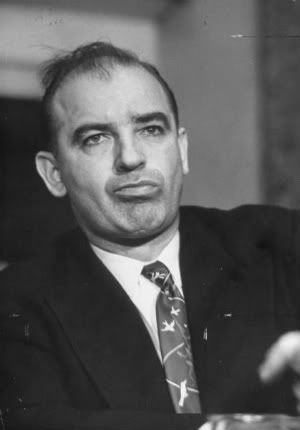
This was the face of the Republican Party as 1952 approached: depressed, dazed, and uncomfortable. The Dewey-Taft Feud had destroyed party unity, plunging the Party of Lincoln into minority status on Capitol Hill and leaving out-of-work Republicans in its’ wake. Taft’s Presidential aspirations drove a wedge further into the Party as it became clear that his nomination would most likely alienate moderate and liberal voters. Having lost the White House in 1940, the Democrats looked poised to regain it twelve years later. Faced with bleak prospects in the upcoming Presidential election, gloomy Republicans prayed for a miracle that would somehow turn things around. Joseph McCarthy, seen in the picture above, was one such Republican. A former marine with a reputation of being dishonest, McCarthy was elected to the Senate as a moderate in 1946. Even though he was a popular speaker, McCarthy’s impatience and quick temper relegated him to an obscure spot on the Agricultural Committee. He sat on the sidelines during the Dewey-Taft Feud, watching helplessly as his Party’s hold on power collapsed. Wiley’s defeat at the polls in 1950 elevated McCarthy to senior status; however, that did little to improve The Pepsi Cola Kid’s morale (the derisive nickname stemming from the fact that McCarthy had accepted $20,000 from a Pepsi bottling executive). Up for re-election in 1952, McCarthy was grimly contemplating his future.
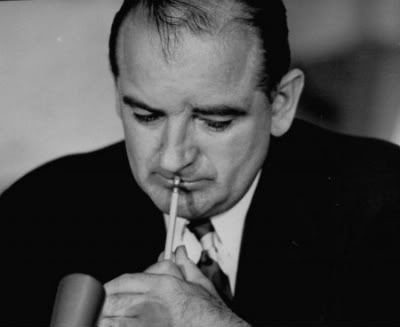
He was worried that bleak Republican prospects would condemn him to being a one-termer. Desperate to save his seat, McCarthy hit upon with an idea. Single-handily, he had a solution to his Party’s woes: frighten the American people by accusing the Democrats of plotting to commit treason and sabotage. Addressing an audience in Dallas, Texas on October 9th, 1951, the Senator praised the work of the House Committee on Un-American Activities for investigating Communist influence in all walks of life and for making people testify on not only their own actions but on the actions of the people they knew. He commended the Dewey Administration for rooting-out Communist influence within the Federal Government. However, according to him, they were missing “the obvious source of Communist subversion.”
That’s when he unveiled his big idea. Holding up several sheets of paper, McCarthy claimed that he had information on known Communist agents and sympathizers being harbored within the Democratic Party:
“The liberal wing of the Democratic Party is infested with Communists. I have here in my hand a list of fifty-seven names who are card-carrying members of the Communist Party. These Leftists are undoubtedly working and shaping policy in the Democratic Party.”
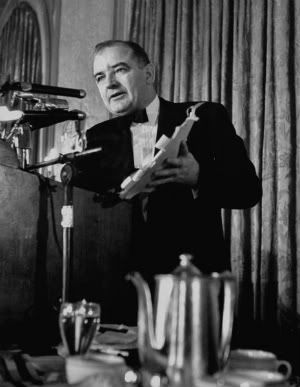
With the Soviets tightening their hold over Eastern Europe, the Chinese backstabbing the Americans to help the Communists, and First Lightning, McCarthy’s sensational charge against the Democratic Party helped make him a national figure. To Republicans, he became a hero for attacking the opposition and raising questions about their anti-Communist credentials (or lack of) – helping to divert public attention away from G.O.P. in-fighting. Democrats, of course, were incensed at being depicted as being in bed with Communism. Put on the defensive by colorful accusations, they pointed out that McCarthy had no substantial evidence to back up his allegations. Whereas the G.O.P. considered him a patriot, the Democrats called McCarthy a desperate character assassin and warned he was merely trying to “confuse and divide the American people to a degree far beyond the hopes of the Communists themselves.”
In response, the Republicans counter-argued that the Democrats were guilty of “the most brazen whitewash of treasonable conspiracy in our history.”
With the American people now apprehensive at the thought of installing a Democratic administration in 1952 (polls were predicting this trend until McCarthy came along), McCarthy continued his exploitation of the fear of Communism by accusing the Democrats of failing to deal with this ideology within their ranks. Indeed, his style of attacking the opposition through demagoguery, baseless defamation, and mudslinging coined a new term: McCarthyism.
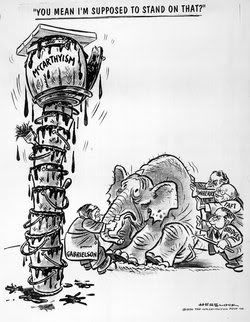
What did the President think of the now-nationally prominent Wisconsin Senator? Like many Republicans, Dewey endorsed McCarthy’s idea of discrediting the Democrats as being in the pocket of Communism in order to hold onto power for another four years. Always sensitive about being seen as soft on Communism, the President was more than happy to stand behind his new ally in the crusade against those “Red Democrats” who were “protecting Communists and shielding traitors.”
For Americans voters, what had been “it’s time for a change” in 1952 became a question about national security. Should they revoke that desire for change and keep the Republicans in charge out of fear of Communist subversion? Or should they take a chance on the Democrats who might be soft on Communism? No one knew which way the pendulum would swing as the emotionally-charged election season began in snowy New Hampshire.
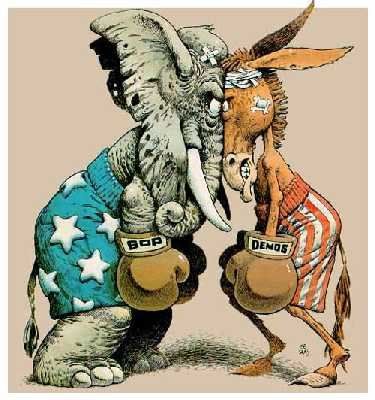
I am glad you like Attlee, but sadly not everyone in Britain does.
El Pip: To be honest, I haven't given much thought to the British postwar domestic scene. In TTL, Churchill's Party wins the 1944 General Election but loses to Labour in 1948 (this is all based on thevaliant's The Proper US and UK Elections mini-mod). I have made the assumption that Churchill in 1944-1948 follows the Conservative course and Attlee in 1948-1952 follows the Labour course. Not much beyond that, I am afraid.
The mini-mod has an election event for May 1952. As with '44 and '48, whoever wins that is how I will treat British postwar domestic policy in a nutshell.
By the way, there's also ahistorical elections for 1956 and 1961. I will be sure to mention them.
trekaddict: How's your friend doing, if I may ask?
El Pip: Good question.
--------------------------------------------------------------------------
The Rise of McCarthy

This was the face of the Republican Party as 1952 approached: depressed, dazed, and uncomfortable. The Dewey-Taft Feud had destroyed party unity, plunging the Party of Lincoln into minority status on Capitol Hill and leaving out-of-work Republicans in its’ wake. Taft’s Presidential aspirations drove a wedge further into the Party as it became clear that his nomination would most likely alienate moderate and liberal voters. Having lost the White House in 1940, the Democrats looked poised to regain it twelve years later. Faced with bleak prospects in the upcoming Presidential election, gloomy Republicans prayed for a miracle that would somehow turn things around. Joseph McCarthy, seen in the picture above, was one such Republican. A former marine with a reputation of being dishonest, McCarthy was elected to the Senate as a moderate in 1946. Even though he was a popular speaker, McCarthy’s impatience and quick temper relegated him to an obscure spot on the Agricultural Committee. He sat on the sidelines during the Dewey-Taft Feud, watching helplessly as his Party’s hold on power collapsed. Wiley’s defeat at the polls in 1950 elevated McCarthy to senior status; however, that did little to improve The Pepsi Cola Kid’s morale (the derisive nickname stemming from the fact that McCarthy had accepted $20,000 from a Pepsi bottling executive). Up for re-election in 1952, McCarthy was grimly contemplating his future.

He was worried that bleak Republican prospects would condemn him to being a one-termer. Desperate to save his seat, McCarthy hit upon with an idea. Single-handily, he had a solution to his Party’s woes: frighten the American people by accusing the Democrats of plotting to commit treason and sabotage. Addressing an audience in Dallas, Texas on October 9th, 1951, the Senator praised the work of the House Committee on Un-American Activities for investigating Communist influence in all walks of life and for making people testify on not only their own actions but on the actions of the people they knew. He commended the Dewey Administration for rooting-out Communist influence within the Federal Government. However, according to him, they were missing “the obvious source of Communist subversion.”
That’s when he unveiled his big idea. Holding up several sheets of paper, McCarthy claimed that he had information on known Communist agents and sympathizers being harbored within the Democratic Party:
“The liberal wing of the Democratic Party is infested with Communists. I have here in my hand a list of fifty-seven names who are card-carrying members of the Communist Party. These Leftists are undoubtedly working and shaping policy in the Democratic Party.”

With the Soviets tightening their hold over Eastern Europe, the Chinese backstabbing the Americans to help the Communists, and First Lightning, McCarthy’s sensational charge against the Democratic Party helped make him a national figure. To Republicans, he became a hero for attacking the opposition and raising questions about their anti-Communist credentials (or lack of) – helping to divert public attention away from G.O.P. in-fighting. Democrats, of course, were incensed at being depicted as being in bed with Communism. Put on the defensive by colorful accusations, they pointed out that McCarthy had no substantial evidence to back up his allegations. Whereas the G.O.P. considered him a patriot, the Democrats called McCarthy a desperate character assassin and warned he was merely trying to “confuse and divide the American people to a degree far beyond the hopes of the Communists themselves.”
In response, the Republicans counter-argued that the Democrats were guilty of “the most brazen whitewash of treasonable conspiracy in our history.”
With the American people now apprehensive at the thought of installing a Democratic administration in 1952 (polls were predicting this trend until McCarthy came along), McCarthy continued his exploitation of the fear of Communism by accusing the Democrats of failing to deal with this ideology within their ranks. Indeed, his style of attacking the opposition through demagoguery, baseless defamation, and mudslinging coined a new term: McCarthyism.

What did the President think of the now-nationally prominent Wisconsin Senator? Like many Republicans, Dewey endorsed McCarthy’s idea of discrediting the Democrats as being in the pocket of Communism in order to hold onto power for another four years. Always sensitive about being seen as soft on Communism, the President was more than happy to stand behind his new ally in the crusade against those “Red Democrats” who were “protecting Communists and shielding traitors.”
For Americans voters, what had been “it’s time for a change” in 1952 became a question about national security. Should they revoke that desire for change and keep the Republicans in charge out of fear of Communist subversion? Or should they take a chance on the Democrats who might be soft on Communism? No one knew which way the pendulum would swing as the emotionally-charged election season began in snowy New Hampshire.

Last edited:
I'm forced to disagree, the 'sad' part is the poor misguided fools who like the inept, traitorous buffoon and his legacy of poverty and misery.I am glad you like Attlee, but sadly not everyone in Britain does.
Onto the update, the thing that gets me about the whole McCarthy episode is that the Democrats were surprised by it. Politicians have been lying and hurling mud for centuries and the Dems were the left of centre party, accusing them of Communist tendencies was always going to be an obvious one for a slightly shifty politician (i.e. most of them). Why they didn't see it coming is something of a mystery.

